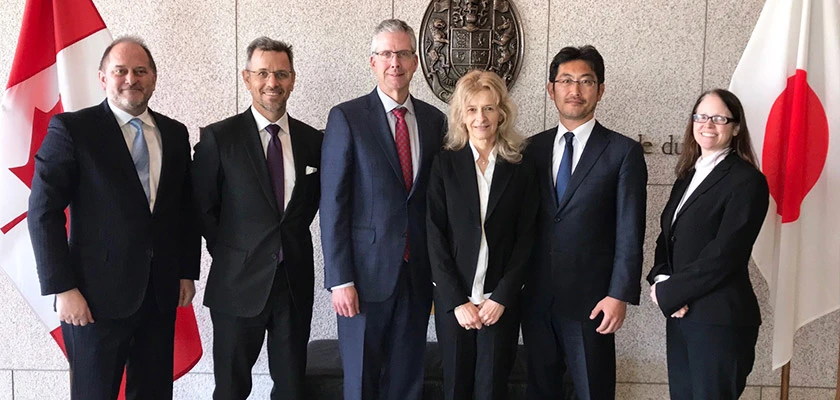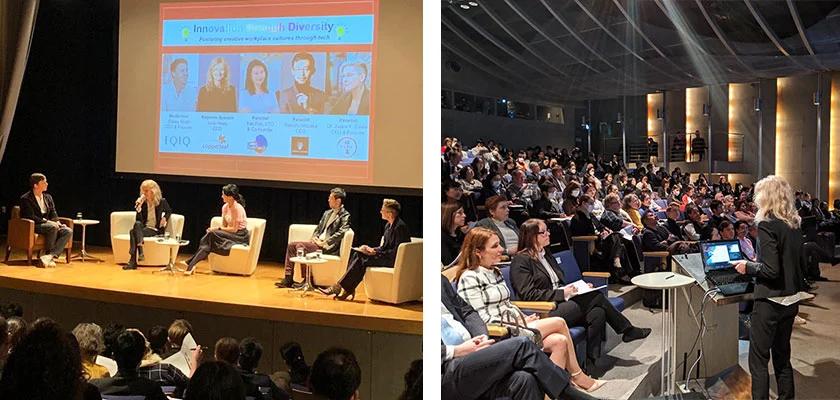Talent 100: Innovation Through Diversity

From left: David Bostwick, Paul Sakrzewski, Ambassador Ian Burney, Judi Hess, Hayato Osawa, Lesley-Ann Reed
On my last trip overseas before the pandemic lockdown, I had the opportunity to participate in an “Innovation Through Diversity” symposium hosted by the Embassy of Canada in Tokyo, Japan. This event, organized by For Empowering Women (FEW) Japan, highlighted how diversity is key to innovation and improved company performance in the tech world. Since October 11 is International Day of the Girl—declared by the United Nations to increase awareness of gender inequality faced by girls worldwide—I thought it might be a good opportunity to recap the themes discussed at the FEW event and share some of the things that inspire me.
Embracing equality, diversity, and inclusion is vital for success in today’s world. It begins with education and ensuring that the same opportunities are available to both girls and boys. According to the UN, “Worldwide, nearly 1 in 4 girls aged 15–19 years is neither employed nor in education or training compared to 1 in 10 boys of the same age.”
Having additional perspectives and ideas drives innovation and gives us a competitive advantage. Warren Buffett once said, “We’ve seen what can be accomplished when we use 50% of our human capacity. Just imagine what 100% can do.” Buffett was speaking about encouraging more women to enter the workforce, and using that potential to power our economy.
Japan is currently 121st on the Global Gender Gap Report (2020), and former prime minister Shinzo Abe has stated his intention to enhance cooperation with the international community in order to improve women’s empowerment and gender equality within his nation. Abe has touted the power of women as “the greatest potential for the growth of the Japanese economy” and said that creating “a society in which women shine” is for the betterment of the entire world.
We’ve seen what can be accomplished when we use 50% of our human capacity. Just imagine what 100% can do.
Warren Buffett
I am a big proponent of using 100% of human capacity to drive the world forward, and I am specifically focused on increasing the number of women in leadership to create a step change. I call my approach Talent 100, which includes actions for both men and women:
- Reject the idea that there are “no qualified candidates” by ensuring that the candidate pool for leadership positions includes 50% female and 50% male applicants.
- Eliminate the barriers for women. This is a call to action for men, especially those in positions of power, to provide opportunities for women and overcome unconscious biases through learning. I know I would not be where I am today if it weren’t for a few key men who saw potential and took a chance on me!
- Just say “YES!” I encourage women to always accept a position in leadership when given the chance. You might not think you have all the skills required, but I can tell you through experience that the man sitting beside you doesn’t either, but he won’t hesitate in taking the job!
At the symposium, I participated in a dynamic panel discussion with Satoshi Ishizaka, CEO of Asian Caesars, Yan Fan, CTO and co-founder of Code Chrysalis, and Dr. Jackie Steele, Associate Professor at Nagoya Univeristy and CEO of en-joi D&I Consulting. We explored the interdependence of innovation and diversity in the tech world, and discussed how to foster creative workplace cultures in Japan.

Satoshi said, “We see women performing certain roles and men in charge. This picture needs to change.” I often mention poet and activist James Baldwin’s quote, “you are formed by what you see” which helps explain why it’s so important for young women to see strong female leaders—so that they realize that they belong there too.
Yan explained “shoganai”, a Japanese word that can be translated to “it can’t be helped” and is often used to describe Japanese culture. She explained that it’s how Japanese people are able to deal with tragedy and also overcome things like natural disasters—but it can also lead to complacency and stifle change and innovation.
I explained my belief that the key to embracing change and unleashing innovation within an organization is through intentional culture. That’s why at Copperleaf, every employee is involved in our culture’s development and continuous improvement. Our culture wasn’t handed down by management or HR. Instead, it was co-created through a process of deliberative democracy—we removed the power structure and allowed all employees to have a discussion and debate about what the culture should be. This is especially important in a fast-growing company because we want to ensure our culture is constantly evolving and reflects the ideas and values of all our employees, including those who are new to the company. We need to engage every person in this dialogue to determine how we want to work together to be the most successful.
It was an engaging afternoon of discussions and I was truly honored to be included in this event—to learn more about the Japanese culture, and be given the opportunity to present on such a timely topic. I look forward to continuing this important dialogue. By bringing awareness to these issues, I hope we can usher in a new era for girls and women, because we’re going to need everyone’s help to tackle the many challenges needed to make the world a better place.
We’re always seeking talented and diverse individuals to join our growing team! Check out our current job openings here.

